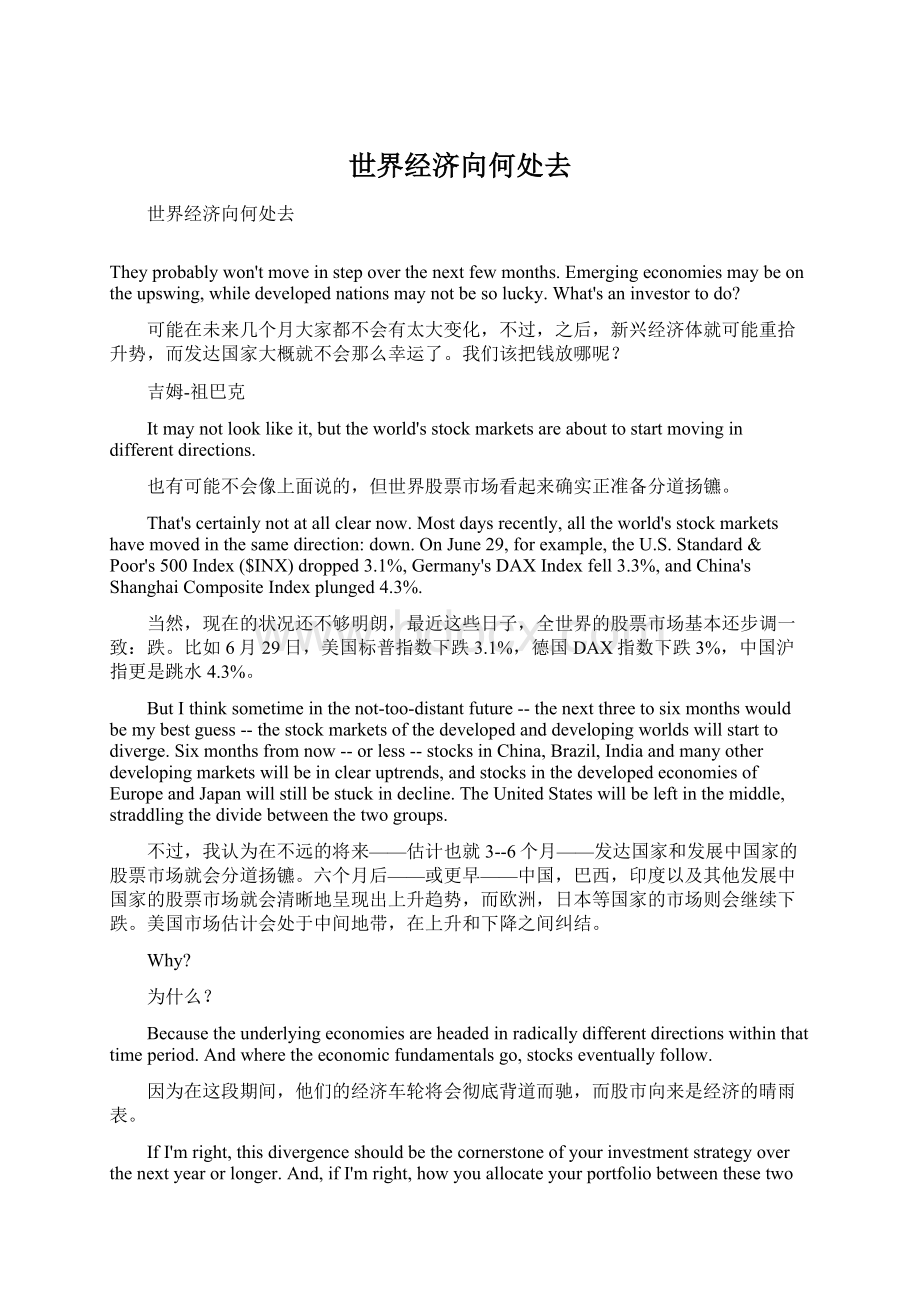世界经济向何处去.docx
《世界经济向何处去.docx》由会员分享,可在线阅读,更多相关《世界经济向何处去.docx(6页珍藏版)》请在冰豆网上搜索。

世界经济向何处去
世界经济向何处去
Theyprobablywon'tmoveinstepoverthenextfewmonths.Emergingeconomiesmaybeontheupswing,whiledevelopednationsmaynotbesolucky.What'saninvestortodo?
可能在未来几个月大家都不会有太大变化,不过,之后,新兴经济体就可能重拾升势,而发达国家大概就不会那么幸运了。
我们该把钱放哪呢?
吉姆-祖巴克
Itmaynotlooklikeit,buttheworld'sstockmarketsareabouttostartmovingindifferentdirections.
也有可能不会像上面说的,但世界股票市场看起来确实正准备分道扬镳。
That'scertainlynotatallclearnow.Mostdaysrecently,alltheworld'sstockmarketshavemovedinthesamedirection:
down.OnJune29,forexample,theU.S.Standard&Poor's500Index($INX)dropped3.1%,Germany'sDAXIndexfell3.3%,andChina'sShanghaiCompositeIndexplunged4.3%.
当然,现在的状况还不够明朗,最近这些日子,全世界的股票市场基本还步调一致:
跌。
比如6月29日,美国标普指数下跌3.1%,德国DAX指数下跌3%,中国沪指更是跳水4.3%。
ButIthinksometimeinthenot-too-distantfuture--thenextthreetosixmonthswouldbemybestguess--thestockmarketsofthedevelopedanddevelopingworldswillstarttodiverge.Sixmonthsfromnow--orless--stocksinChina,Brazil,Indiaandmanyotherdevelopingmarketswillbeinclearuptrends,andstocksinthedevelopedeconomiesofEuropeandJapanwillstillbestuckindecline.TheUnitedStateswillbeleftinthemiddle,straddlingthedividebetweenthetwogroups.
不过,我认为在不远的将来——估计也就3--6个月——发达国家和发展中国家的股票市场就会分道扬镳。
六个月后——或更早——中国,巴西,印度以及其他发展中国家的股票市场就会清晰地呈现出上升趋势,而欧洲,日本等国家的市场则会继续下跌。
美国市场估计会处于中间地带,在上升和下降之间纠结。
Why?
为什么?
Becausetheunderlyingeconomiesareheadedinradicallydifferentdirectionswithinthattimeperiod.Andwheretheeconomicfundamentalsgo,stockseventuallyfollow.
因为在这段期间,他们的经济车轮将会彻底背道而驰,而股市向来是经济的晴雨表。
IfI'mright,thisdivergenceshouldbethecornerstoneofyourinvestmentstrategyoverthenextyearorlonger.And,ifI'mright,howyouallocateyourportfoliobetweenthesetwodivergingblocksofeconomiesandmarketswilldeterminehowwellyourinvestmentsperformduringthatperiod.
如果被我猜中,那你需要在明年甚至更长的时间里,把全球经济的分化作为指导投资的基本战略;如果被我猜中,你如何在分化的两个阵营分配投资比例,将会决定这段时间你的投资表现。
Letmelayoutthecaseforthisdivergenceintheeconomicfundamentalsandstockmarkets.AndthenyoucanjudgeforyourselfifI'mrightornot.
现在让我把经济上和股票市场上的分化详细说明一下,然后你自己就可以判断我说的对不对了。
Theproblemwithfixingtheproblem
问题以及解决问题
TherecentG-20meetingoftheworld'slargesteconomiesmarksagoodstartingpointforlookingattheeconomiesofthedevelopedworld.
最近召开的G20峰会是一个很好的切入点来审视发达国家的经济状况。
Andwhenwelook,whatdowesee?
当我们看过去,我们会看到什么?
Annualgovernmentbudgetsthataredeeplyinthered.TheU.S.budgetdeficitisforecastat10.6%ofGDPin2010.TheUnitedKingdom'sisforecastat10.1%.Spain'sisforecastat9.1%;France's,8%;Japan's,6.4%;Germany's,5.5%.
政府的年度预算已经深深地陷入红色海洋。
美国政府的2010年财政预算估计占到GDP的10.6%,英国的预计占到10.1%,西班牙9.1%,法国8%,日本6.4%,德国5.5%。
Howbadarethosenumbers?
Economistsestimatethatabudgetdeficitof3%ofGDPissustainable.Abovethat,acountryispilingupdebtthatitcan'trepayunderreasonableassumptionsofgrowth(andmanageableinflation).Inthelongrun,thatleadstofallinggrowthrates,climbinginterestratesandfinallyfiscalcrisis.
这些数字有多糟?
经济学家认为,预算赤字只有3%左右才是可承受的。
如果超过了这个数值,那这个政府按照正常的收入增长预期将无法偿还逐渐增加的债务。
长期如此运行,将会导致经济增长下降,利率攀升,继而财政危机。
That'swhythefinalcommuniquéfromtheG-20madesuchabigdealoftwodeadlines.First,leadersoftheG-20agreedthattheywouldaimtocuttheirannualdeficitsinhalfby2013and,second,aimtostabilizeorreducethetotalgovernmentdebt-to-GDPratioby2016.That'stantamounttoacalltoreduceannualbudgetdeficitsto3%ofGDPorless.
这也是为什么G20费那么大劲最终对两个期限达成一致。
第一,G20的各国领袖同意以此为目标,在2013年削减一半的年度赤字,第二,在2016年稳定并缩小政府债务与GDP的比值。
这也就意味着将把预算赤字减少到GDP的3%以下。
TheleadersoftheG-20werecarefulnottocallanyofthisanactualagreementorevenapromise.Theseweregoals,aims,expectations.(FormoreonexactlywhattheG-20meetingdidordidn'tachieve,seethispostonmywebsite.)
G20的领袖们非常小心,对于这个成果从不用协议,甚至承诺的字样,他们称之为目标,期望。
Butstill,aslooseasthetimingintheseaimsis,asvagueasthesepromisesturnouttobe,asgoodastheoddsarethatnocountryinthegroupwillactuallyachievethesegoals,theagreementdoesindeeddescribeabroadeconomictrajectorythatgoeslikethis:
High-deficitdevelopedcountrieswillcutgovernmentspendingoverandoverduringthenextfiveyearsorso.Thecutsaren'tlikelytobeseriousenoughtoendthedebtcrisisintheseeconomies,sothetotalpackageovertimewillincludelessgovernmentspending,highertaxes,slowereconomicgrowthandrisinginterestrates.
是的,尽管这些目标的期限松散,承诺模糊,甚至很可能没有国家能够完成,可是这个协议仍然清晰描述了这样的发展轨迹:
高赤字发达国家将在未来5年不断的削减财政支出。
由于这些支出的削减并不足以结束债务危机,所以在这段时间将会出现这样一个局面:
政府削减支出,提高税收,经济增速放缓,利率升高。
Asafuelforstocks,that'sgotaboutasmuchbangasawetsquibaweekaftertheFourthofJuly.Butthat'sthecoursethatcountriessuchasFrance,Spain,theUnitedKingdomandmaybeevenGermanyhavechosen.
可是若把这个做为提振股市而弄出的响动的话,就如同独立日过了一周后,点了一个水泡了的爆竹。
但,这正是法国,西班牙,英国甚至还有德国的选择。
Contrastthatwiththepaththattheworld'sbigdevelopingeconomiesareheadeddownintheyearsfromnowto2013or2016,theyearsintheG-20newsrelease.
从现在到2013年或2016年(G20公告提到的期限),把他们的发展轨迹同新兴经济体相比,肯定是向下的走的。
Brazil,India,Chinaandotherdevelopingnationsdon'thavehugedebtsfromthefinancialcrisisandsubsequentstimulusspendingtopayoff.Forexample,Brazil'sgovernmentdeficitiscurrentlyrunningatabout3.24%ofGDP.TheInternationalMonetaryFundestimatesthattheratioofgovernmentdebttoGDPindevelopedeconomieswillriseto110%by2015from91%attheendof2009.Incomparison,inApril2010Brazil'sgovernmentdebtamountedtojust42%ofGDPandisheadeddownto30%ofGDPby2014,theBraziliangovernmentestimates.
这次金融危机并没有给巴西,印度,中国以及其他发展中国家带来太多的债务。
例如,巴西政府当前的赤字水平是GDP的3.24%。
国际货币基金组织预计,发达国家的债务水平将会从2009年的91%上升到2015年的110%。
相比之下,巴西政府在2010年4月的债务占GDP的42%,到2014年将会下降到30%,巴西政府预计。
That'snotjustthestabilizationthattheG-20aimedforasagoalby2016initsrecentnewsrelease--it'sanactualdecreaseintheburdenofgovernmentdebtontheeconomy.AndthedeclineindebtandtherestrainedspendingpatternareamongthereasonsBrazilearneditsfirst-everinvestment-graderatingfromStandard&Poor'sthisyear.
G20到2016年的目标并不仅是稳定债务水平,而是希望切实减少政府的债务负担。
巴西在今年第一次获得了标准普尔给予的投资级别评价,其原因之一正是逐渐减少的债务和严格控制的支出模式。
Troubleofadifferentsort
不一样的麻烦
That'snottosaytheworld'sdevelopingeconomiesdon'thaveproblems.Chinahasanassetbubbleinrealestate,aswellasarunawaymoneysupplythatthreatenstosendinflationsoaring.InflationinBrazilisrunningatbetterthan5.2%,wayabovethegovernment'stargetof4.5%.Indiaisfacingsimilarinflationarypressures.
这并不是说新兴市场的经济发展没有问题,中国的房地产泡沫已十分严重,同时,失控的货币供应已经开始助跑通胀了。
在巴西,通货膨胀率已达5.2%,远高出政府4.5%的预期,而印度也面临着同样的通胀压力。
Andthere'saveryrealpossibilitythatmeasurestocontrolinflation--interest-rateincreasesorincreasesinthebankreserverequirement--willovershootand,combinedwiththeslowdowningrowthinthedevelopedworld,sendeconomicgrowthratesinChina,Brazilandtherestoftheexport-orientedeconomiesofthedevelopingworldlowerthanexpected.
在像巴西、中国这样以出口为主的发展中国家,若以加息或提高存款准备金率控制通货膨胀的话,非常有可能会调控过度,再加上发达国家的经济增长下降,势必会影响他们自身的经济增长。
Butlookattheverydifferentnatureoftheproblemsfacingthedevelopedanddevelopinggroups.It'stoolittlegrowthandthepossibilityofevenmoreslowinginthedevelopedworldversustoomuchgrowthandthepossibilityofastumbleinthedevelopingworldasgovernmentstheretrytokeepgrowthundercontrol.
但,我们发达国家和发展中国家面临的问题在本质上是不同的。
发达国家的问题是增长过慢,以及增长可能还要更慢,而发展中国家则是增长速度太快以及由于跑的过快,政府想控制所以可能会绊倒。
Andlookattheverydifferenttimeframesforworkingoutthoseproblems.
另外,还有解决这些问题的时间表也是很不一样。
Inthedevelopedeconomies,we'relookingataverylong,slowgrindbacktofiscalstability.Years.2016.Evenifpoliticiansandvotersdecidetotakethepainthatdoingwhat'snecessarywillentail.
对于发达国家,我们看到的是非常遥远,动作迟缓的回复财政稳定,即使政治家和选民们决定承担必要的痛苦,还要一直等到2016年。
Andinthedevelopedeconomies,we'relookingataveryrealpossibilitythatinthetimeperiodI'mtalkingabout--nowthrough2016--thingswillgetworsebeforetheygetbetter.Moreunemployment.Slowergrowth.Goodieslikethat.
对于发达国家,在2016年前,他们极有可能继续下行,触底后才有可能向上反弹,这就是说,我们还会有更多的失业,更低的增长,等等类似的小甜点。
Andthat'snotevenconsideringtheveryrealpossibilitythatwe'llalldecidetoshirkthehardworkandoptfortheeasiestshort-termsolutions.Thatputsusinthedevelopedworldinatrulyhorriblepositionforfacingthereallybigproblemsthatwillarriveby2030,whenanagingpopulationcatchesupwithalloftheworld'smajoreconomies(withtheexceptionofBrazilandIndia,wheredemographicsdon'tgetnastyquitesoquickly).
上面还没考虑我们很有可能会躲开困难头疼的问题,去选择简单短期的解决办法,而这又会把我们放入一个更危险的境地,因为我们在2030年的时候会面临全球步入老龄社会的问题,包括世界上所有主要经济体(巴西,印度稍好一点)。
Thedevelopingeconomies,ontheotherhand,arelookingatrelativelyshort-termrisksoflower-than-projectedgrowth,theburstingofanassetbubbleortwoandhigherinterestrates.Butinalllikelihood,theworstofthatwillbeoverbythebeginningof2011.
而对于发展中国家来说,他们的问题是短期的经济增长速度会低于预期,一个或两个资产泡沫的破裂以及较高的利率。
不过,这些问题基本上都会在2011年初过去。
Brazil,forexample,lookslikeitwillstopraisinginterestratesin2010.India,too.Chinaiswellontheroadtorefinancingitsbankingsystem(usingtechniquesforburyingbaddebtdevelopedinthelate1990stofixtheexcessesoftheAsiancurrencycrisis),ifnotthisyear,thennext.Andthatwillputworriesaboutareal-estatebubbletorest.(FormoreonwhyChinamightreallybebroke--iftheaccountingwerehonest--andhowChinaplanstoburytheproblemsee"China'sPonzi-likebankingpolicy.")
比如巴西,貌似在2010年会停止加息。
印度也差不多。
中国正在平稳的为其银行系统筹资,今年不结束,明年也会完成,这也会使房地产泡沫的危机的财务风险悄声化解。
Inotherwords,developingeconomiesstillfacepain,butit'sshort-runpain.Andit'slikelytob